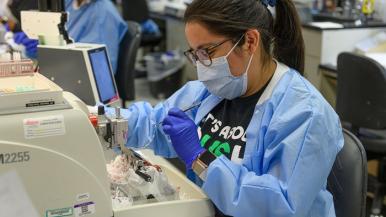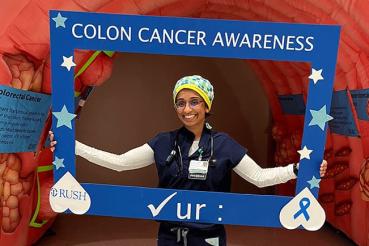Rush Medical Laboratories have always played an essential role in diagnosing and treating patients throughout Rush University Medical Center. Rush is recognizing their hard work during Medical Laboratory Professional Week, an annual celebration of laboratory professionals and pathologists, April 18-24.
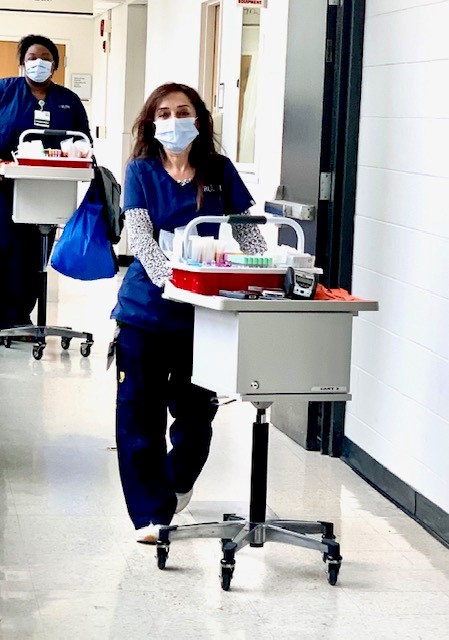
Lab professionals have the skills to unlock important medical informational that is vital to diagnosis, treatment and prevention of disease. Approximately 75% of the information found on a patient’s medical record is clinical laboratory results.
Rush providers depend on our laboratory professionals to perform tests on blood and other body fluids, interpret and ensure accurate lab results, and help provide a complete picture of a patient’s health. Using biomedical equipment and complicated analysis, they can detect cancer, identify infectious viruses and bacteria, ensure the quality and compatibility of blood products and so much more.
Rush Medical Laboratories are comprised of phlebotomists and members of the Core Laboratory, Clinical Microbiology Laboratory, Human Leukocyte Antigen Laboratory, Blood Bank, Anatomic Pathology, Flow Cytometry, Molecular Oncology, and Genetics.
A key role in our COVID-19 response
Throughout the COVID-19 pandemic, Rush Medical Laboratories have assisted in the diagnosis and treatment of COVID-19 patients — from developing tests to drawing patients’ blood to providing fresh blood for extracorporeal membrane oxygenation (ECMO) treatments.
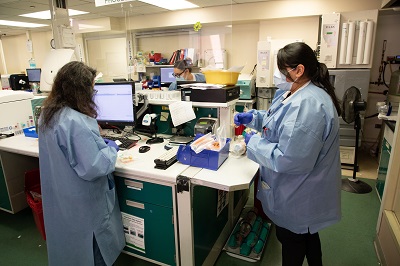
In three shifts, working around the clock, the Core Laboratory team examined blood samples under microscopes, looking for elevated amounts of disease-fighting white blood cells that indicate how patients’ immune systems are responding. They also began running a test for bacterial co-infection that they previously sent to a reference lab; offering the test on-site sped up the turnaround time for providing vital information to the clinical team. The Core Lab’s work was made possible thanks to Rush phlebotomists, who draw patient's blood samples.
At the beginning of the pandemic, a big challenge was the availability of tests to diagnose COVID-19. Early in Rush’s response, when commercial labs took a week or more to provide test results, the Clinical Microbiology Laboratory team developed and validated its own in-house test in just 10 days — a process that normally would have taken months.
The Human Leukocyte Antigen (HLA) Laboratory also developed, validated and implemented a test that never had been offered at Rush before. The test detects elevated levels of a molecule called Interleukin 6 (IL6) that is normally produced in the body as part of the immune system's response to infection. Some published data has shown that increased IL6 levels can serve as a predictor for respiratory failure in patients infected with COVID-19.
As Rush began to treat some of the most critically ill COVID-19 patients, it led to the use of ECMO. ECMO, a type of life support that uses a machine to do the work of a patient’s heart and lungs, requires the use of donated blood to prime the machine. The Blood Bank staff ensures the availability of fresh blood (no more than two days old) in the right blood types and quantities so the clinical team can quickly place a patient on ECMO.
Vital to providing quality care
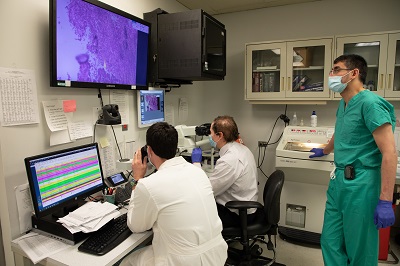
Laboratory professionals work in hospitals, doctor’s offices or private laboratories. Others are employed by university and industrial research laboratories and forensic settings to seek solutions for medicine’s many unanswered questions. Whatever the setting — laboratory professionals are key members of any health care team. Here at Rush, quality care would not be possible with the work of its laboratory team members.
To learn more about Rush Medical Laboratories you can get to know our laboratory managers in Q and A on rush.edu and see photos of Rush laboratory professionals in our flickr gallery.

